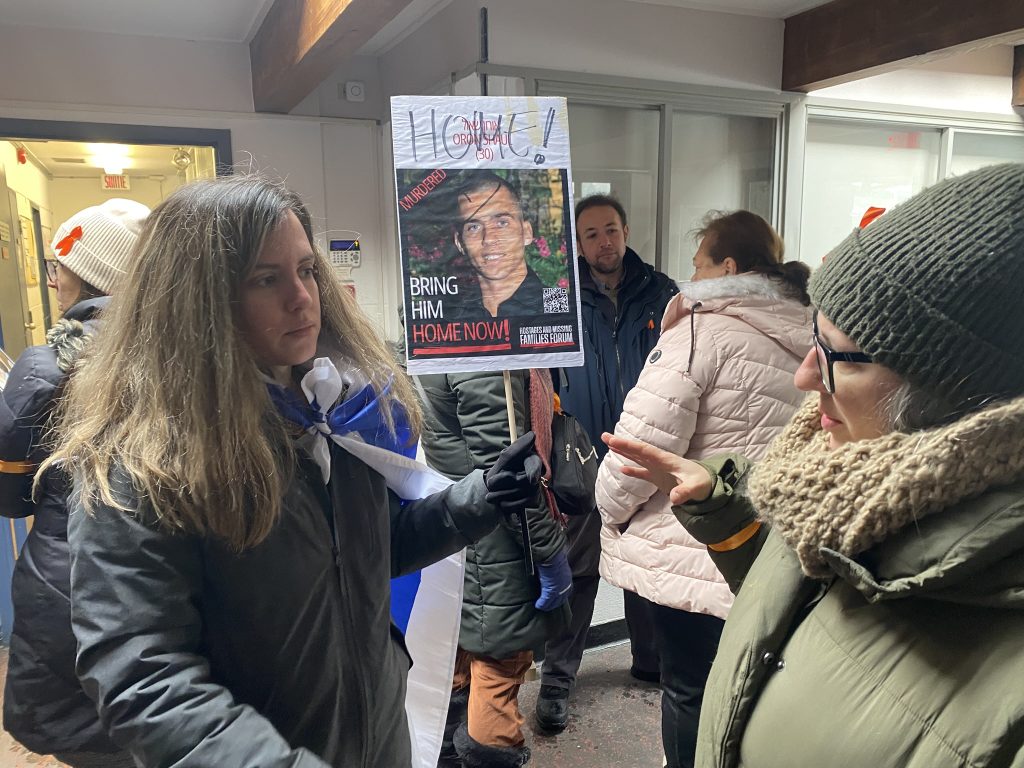RSS
Montreal’s weekly walk calling to free the hostages coincides with the release of three held for 470 days
As the literal first breaths of the hostage release saw three young women released into the aching arms of their families and nation, participants in the Bring Them Home Montreal march gathered for their 54th Sunday walk in the city’s west end with renewed vigour and purpose.
For more than a year, people of all ages have routinely walked through Hampstead, Côte Saint-Luc and Snowdon, chanting for the freedom of the hostages and saying their names.

This week, some 80 marchers sported orange ribbons in honour of the second birthday of Kfir Bibas, who was kidnapped on Oct. 7 from Kibbutz Nir Oz at eight months old with his 4-year-old brother Ariel, and parents Shiri and Yarden.
The mood on this frigid day—where wind chill neared minus-20 as marchers made their way down ice-covered sidewalks, under police escort as always—was mixed, a combination of elation to see three daughters of Israel return and angst over future stages of the deal and the fate of the remaining hostages.

Between all the smiles and tears, co-organizer Keren Zach told The CJN the feeling right now “is it’s making a deal with the devil. But we need our people home, they deserve to be home, and right now, Emily, Romi and Doron are on their way to see their moms in the next few minutes. And this is the reason why we’re doing this right now, and we’re going to continue marching until every single one of them are home.”
Asked if this is the beginning of a semblance of justice for Israel, Zach said, “I can’t tell you. We deserve it. I wish it to be yes. But no, not by the way the world is acting. It’s as if we don’t matter.”
She pointed to the extremist language of anti-Israel demonstrators in Montreal the very night the deal for the hostage release and ceasefire were announced, as the crowd chanted calls for intifada and shouted praise in honour of Yahya Siwar and other terrorist leaders.
Philip Greenstein was among the marchers on this historic day. “You can’t be human without being happy that daughters will be returned to their mothers and fathers,” he said. “We understand that the price that Israel has already paid from Oct. 7 on, and you realize that cynically said, that there’s really no justice in the world.
“We’re going to have to take a very, very long view of how these people, these families, will never know justice, the families who now have to watch murderers being returned into Gaza with glee.”
Zach lost friends at the Nova music festival, including Dor Malka, “a really sweet guy who loved soccer and always had a smile,” and worked on Kibbutz Holit with Youssef Ziyadne, whose body was recently recovered from Gaza. She cautioned others to “watch news, but don’t watch the news. Try to keep away from it, and don’t set proper expectations, just hope for the best and expect the worst. Don’t overthink it, because they (Hamas) love to do psychological operations.”
As for the questions of who’s alive and who’s not, “These people will only be free once their feet are in Israel. Once they are in Israel, I will breathe for them.”
Greenstein thanks the universe daily “for making me a Jew in this time. Because this is when it counts. This is when it matters to be Jewish. This is how we show we have to transcend words. I wake up at night thinking about hostages, I wake up in the morning thinking about Israel.” Every day, he said, “you walk by people with keffiyehs. I mean, you know, your head explodes.”
“We have to plant our feet firm, and we don’t know whether this is the first or the last wave of what is just the beginning of a multi-generational war for the survival of Judaism. So more than ever we have to be united. We’re just a big bag of humans but there’s something transcendent about being Jewish and that’s what brings us together. And I hope we can remember that now and act like a tribe, like a people who need to be very connected.”
Hampstead city councillor Jack Edery, a frequent marcher in the group, has encountered the extreme rhetoric of anti-Israel protesters—who have been invited by Montreal mayor Valérie Plante and her colleagues to voice their opinions on pro-Israel politicians at Montreal’s agglomeration council.
Edery likened the current mood to how “Yom HaZikaron is always followed by Yom Haatzmaut, one moment we’re crying and one moment we’re celebrating. So today, we celebrate that they’re home, but we cry that the rest of them aren’t. It’s psychological warfare. We don’t know if Kfir Bibas is going to come back alive or if he is going to come back dead. Personally, I think we need to do everything we can to bring back every one of the hostages, and then after they’re all back, we’ll deal with Hamas.”

Bring Them Home Montreal co-organizer Ruben Hassan moved the crowd with a stirring speech about the hostages—whether released or waiting to come home—with a special message for now 2-year-old Kfir Bibas.
“We want to tell you and your brother that you are not alone, every candle lit today represents a prayer for your return, a promise to never stop fighting, for you, for your family and for all those who are still held hostage in Gaza. You are the hope of this nation, the faces of a future where life always triumphs.
“Let this birthday be the last spent far from at home. We are waiting for you with hearts full of love and arms wide open. Happy birthday. Ariel, we are also thinking of you, you are our strength, our hope, and soon you will be back among us.”
The post Montreal’s weekly walk calling to free the hostages coincides with the release of three held for 470 days appeared first on The Canadian Jewish News.
RSS
Hamas Says No Interim Hostage Deal Possible Without Work Toward Permanent Ceasefire

Explosions send smoke into the air in Gaza, as seen from the Israeli side of the border, July 17, 2025. Photo: REUTERS/Amir Cohen
The spokesperson for Hamas’s armed wing said on Friday that while the Palestinian terrorist group favors reaching an interim truce in the Gaza war, if such an agreement is not reached in current negotiations it could revert to insisting on a full package deal to end the conflict.
Hamas has previously offered to release all the hostages held in Gaza and conclude a permanent ceasefire agreement, and Israel has refused, Abu Ubaida added in a televised speech.
Arab mediators Qatar and Egypt, backed by the United States, have hosted more than 10 days of talks on a US-backed proposal for a 60-day truce in the war.
Israeli officials were not immediately available for comment on the eve of the Jewish Sabbath.
Israeli Prime Minister Benjamin Netanyahu’s office said in a statement on a call he had with Pope Leo on Friday that Israel‘s efforts to secure a hostage release deal and 60-day ceasefire “have so far not been reciprocated by Hamas.”
As part of the potential deal, 10 hostages held in Gaza would be returned along with the bodies of 18 others, spread out over 60 days. In exchange, Israel would release a number of detained Palestinians.
“If the enemy remains obstinate and evades this round as it has done every time before, we cannot guarantee a return to partial deals or the proposal of the 10 captives,” said Abu Ubaida.
Disputes remain over maps of Israeli army withdrawals, aid delivery mechanisms into Gaza, and guarantees that any eventual truce would lead to ending the war, said two Hamas officials who spoke to Reuters on Friday.
The officials said the talks have not reached a breakthrough on the issues under discussion.
Hamas says any agreement must lead to ending the war, while Netanyahu says the war will only end once Hamas is disarmed and its leaders expelled from Gaza.
Almost 1,650 Israelis and foreign nationals have been killed as a result of the conflict, including 1,200 killed in the Oct. 7, 2023, Hamas attack on southern Israel, according to Israeli tallies. Over 250 hostages were kidnapped during Hamas’s Oct. 7 onslaught.
Israel responded with an ongoing military campaign aimed at freeing the hostages and dismantling Hamas’s military and governing capabilities in neighboring Gaza.
The post Hamas Says No Interim Hostage Deal Possible Without Work Toward Permanent Ceasefire first appeared on Algemeiner.com.
RSS
Iran Marks 31st Anniversary of AMIA Bombing by Slamming Argentina’s ‘Baseless’ Accusations, Blaming Israel

People hold images of the victims of the 1994 bombing attack on the Argentine Israeli Mutual Association (AMIA) community center, marking the 30th anniversary of the attack, in Buenos Aires, Argentina, July 18, 2024. Photo: REUTERS/Irina Dambrauskas
Iran on Friday marked the 31st anniversary of the 1994 bombing of the Argentine Israelite Mutual Association (AMIA) Jewish community center in Buenos Aires by slamming Argentina for what it called “baseless” accusations over Tehran’s alleged role in the terrorist attack and accusing Israel of politicizing the atrocity to influence the investigation and judicial process.
The Iranian Foreign Ministry issued a statement on the anniversary of Argentina’s deadliest terrorist attack, which killed 85 people and wounded more than 300.
“While completely rejecting the accusations against Iranian citizens, the Islamic Republic of Iran condemns attempts by certain Argentine factions to pressure the judiciary into issuing baseless charges and politically motivated rulings,” the statement read.
“Reaffirming that the charges against its citizens are unfounded, the Islamic Republic of Iran insists on restoring their reputation and calls for an end to this staged legal proceeding,” it continued.
Last month, a federal judge in Argentina ordered the trial in absentia of 10 Iranian and Lebanese nationals suspected of orchestrating the attack in Buenos Aires.
The ten suspects set to stand trial include former Iranian and Lebanese ministers and diplomats, all of whom are subject to international arrest warrants issued by Argentina for their alleged roles in the terrorist attack.
In its statement on Friday, Iran also accused Israel of influencing the investigation to advance a political campaign against the Islamist regime in Tehran, claiming the case has been used to serve Israeli interests and hinder efforts to uncover the truth.
“From the outset, elements and entities linked to the Zionist regime [Israel] exploited this suspicious explosion, pushing the investigation down a false and misleading path, among whose consequences was to disrupt the long‑standing relations between the people of Iran and Argentina,” the Iranian Foreign Ministry said.
“Clear, undeniable evidence now shows the Zionist regime and its affiliates exerting influence on the Argentine judiciary to frame Iranian nationals,” the statement continued.
In April, lead prosecutor Sebastián Basso — who took over the case after the 2015 murder of his predecessor, Alberto Nisman — requested that federal Judge Daniel Rafecas issue national and international arrest warrants for Iran’s Supreme Leader Ayatollah Ali Khamenei over his alleged involvement in the attack.
Since 2006, Argentine authorities have sought the arrest of eight Iranians — including former president Ali Akbar Hashemi Rafsanjani, who died in 2017 — yet more than three decades after the deadly bombing, all suspects remain still at large.
In a post on X, the Delegation of Argentine Israelite Associations (DAIA), the country’s Jewish umbrella organization, released a statement commemorating the 31st anniversary of the bombing.
“It was a brutal attack on Argentina, its democracy, and its rule of law,” the group said. “At DAIA, we continue to demand truth and justice — because impunity is painful, and memory is a commitment to both the present and the future.”
31 años del atentado a la AMIA – DAIA. 31 años sin justicia.
El 18 de julio de 1994, un atentado terrorista dejó 85 personas muertas y más de 300 heridas. Fue un ataque brutal contra la Argentina, su democracia y su Estado de derecho.
Desde la DAIA, seguimos exigiendo verdad y… pic.twitter.com/kV2ReGNTIk
— DAIA (@DAIAArgentina) July 18, 2025
Despite Argentina’s longstanding belief that Lebanon’s Shiite Hezbollah terrorist group carried out the devastating attack at Iran’s request, the 1994 bombing has never been claimed or officially solved.
Meanwhile, Tehran has consistently denied any involvement and refused to arrest or extradite any suspects.
To this day, the decades-long investigation into the terrorist attack has been plagued by allegations of witness tampering, evidence manipulation, cover-ups, and annulled trials.
In 2006, former prosecutor Nisman formally charged Iran for orchestrating the attack and Hezbollah for carrying it out.
Nine years later, he accused former Argentine President Cristina Fernández de Kirchner — currently under house arrest on corruption charges — of attempting to cover up the crime and block efforts to extradite the suspects behind the AMIA atrocity in return for Iranian oil.
Nisman was killed later that year, and to this day, both his case and murder remain unresolved and under ongoing investigation.
The alleged cover-up was reportedly formalized through the memorandum of understanding signed in 2013 between Kirchner’s government and Iranian authorities, with the stated goal of cooperating to investigate the AMIA bombing.
The post Iran Marks 31st Anniversary of AMIA Bombing by Slamming Argentina’s ‘Baseless’ Accusations, Blaming Israel first appeared on Algemeiner.com.
RSS
Jordan Reveals Muslim Brotherhood Operating Vast Illegal Funding Network Tied to Gaza Donations, Political Campaigns

Murad Adailah, the head of Jordan’s Muslim Brotherhood, attends an interview with Reuters in Amman, Jordan, Sept. 7, 2024. Photo: REUTERS/Jehad Shelbak
The Muslim Brotherhood, one of the Arab world’s oldest and most influential Islamist movements, has been implicated in a wide-ranging network of illegal financial activities in Jordan and abroad, according to a new investigative report.
Investigations conducted by Jordanian authorities — along with evidence gathered from seized materials — revealed that the Muslim Brotherhood raised tens of millions of Jordanian dinars through various illegal activities, the Jordan news agency (Petra) reported this week.
With operations intensifying over the past eight years, the report showed that the group’s complex financial network was funded through various sources, including illegal donations, profits from investments in Jordan and abroad, and monthly fees paid by members inside and outside the country.
The report also indicated that the Muslim Brotherhood has taken advantage of the war in Gaza to raise donations illegally.
Out of all donations meant for Gaza, the group provided no information on where the funds came from, how much was collected, or how they were distributed, and failed to work with any international or relief organizations to manage the transfers properly.
Rather, the investigations revealed that the Islamist network used illicit financial mechanisms to transfer funds abroad.
According to Jordanian authorities, the group gathered more than JD 30 million (around $42 million) over recent years.
With funds transferred to several Arab, regional, and foreign countries, part of the money was allegedly used to finance domestic political campaigns in 2024, as well as illegal activities and cells.
In April, Jordan outlawed the Muslim Brotherhood, the country’s most vocal opposition group, and confiscated its assets after members of the Islamist movement were found to be linked to a sabotage plot.
The movement’s political arm in Jordan, the Islamic Action Front, became the largest political grouping in parliament after elections last September, although most seats are still held by supporters of the government.
Opponents of the group, which is banned in most Arab countries, label it a terrorist organization. However, the movement claims it renounced violence decades ago and now promotes its Islamist agenda through peaceful means.
The post Jordan Reveals Muslim Brotherhood Operating Vast Illegal Funding Network Tied to Gaza Donations, Political Campaigns first appeared on Algemeiner.com.
